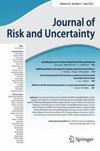On the psychology of the relation between optimism and risk taking
IF 2.3
2区 经济学
Q3 BUSINESS, FINANCE
引用次数: 2
Abstract
Abstract In this paper, we provide an explanation for why risk taking is related to optimism. Using a laboratory experiment, we show that the degree of optimism predicts whether people tend to focus on the positive or negative outcomes of risky decisions. While optimists tend to focus on the good outcomes, pessimists focus on the bad outcomes of risk. The tendency to focus on good or bad outcomes of risk in turn affects both the self-reported willingness to take risk and actual risk taking behavior. This suggests that dispositional optimism may affect risk taking mainly by shifting attention to specific outcomes rather than causing misperception of probabilities. In a second study we find evidence that dispositional optimism is related to elicited parameters of rank dependent utility theory suggesting that focusing may be among the psychological determinants of decision weights. Finally, we corroborate our findings with process data related to focusing showing that optimists tend to remember more and attend more to good outcomes and this in turn affects their risk taking.论乐观主义与冒险心理的关系
在本文中,我们提供了一个解释为什么风险承担与乐观。通过实验室实验,我们发现,乐观程度可以预测人们倾向于关注风险决策的积极结果还是消极结果。乐观主义者倾向于关注好的结果,而悲观主义者则关注风险的坏结果。关注风险的好坏结果的倾向反过来影响自我报告的冒险意愿和实际的冒险行为。这表明性格乐观可能主要通过将注意力转移到特定结果而不是导致对概率的误解来影响风险承担。在第二项研究中,我们发现性格乐观与等级依赖效用理论的引出参数有关,这表明专注可能是决策权重的心理决定因素之一。最后,我们用与专注相关的过程数据证实了我们的发现,表明乐观主义者倾向于记住更多,更关注好的结果,这反过来影响了他们的冒险精神。
本文章由计算机程序翻译,如有差异,请以英文原文为准。
求助全文
约1分钟内获得全文
求助全文
来源期刊

Journal of Risk and Uncertainty
Multiple-
CiteScore
6.30
自引率
10.60%
发文量
29
期刊介绍:
The Journal of Risk and Uncertainty (JRU) welcomes original empirical, experimental, and theoretical manuscripts dealing with the analysis of risk-bearing behavior and decision making under uncertainty. The topics covered in the journal include, but are not limited to, decision theory and the economics of uncertainty, experimental investigations of behavior under uncertainty, empirical studies of real world risk-taking behavior, behavioral models of choice under uncertainty, and risk and public policy. Review papers are welcome.
The JRU does not publish finance or behavioral finance research, game theory, note length work, or papers that treat Likert-type scales as having cardinal significance.
An important aim of the JRU is to encourage interdisciplinary communication and interaction between researchers in the area of risk and uncertainty. Authors are expected to provide introductory discussions which set forth the nature of their research and the interpretation and implications of their findings in a manner accessible to knowledgeable researchers in other disciplines.
Officially cited as: J Risk Uncertain
 求助内容:
求助内容: 应助结果提醒方式:
应助结果提醒方式:


